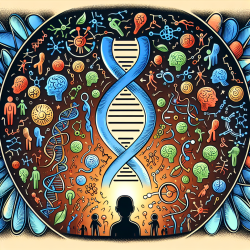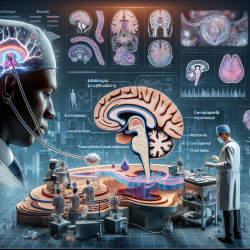Introduction to GATAD2A-Related Neurodevelopmental Disorder
Recent research has shed light on the role of genetic variants in the GATAD2A gene, a component of the nucleosome remodeling and deacetylase (NuRD) complex, in contributing to neurodevelopmental disorders (NDDs). This blog explores the findings of the study titled "De novo variants in GATAD2A in individuals with a neurodevelopmental disorder: GATAD2A-related neurodevelopmental disorder," providing insights for practitioners to enhance their understanding and skills in addressing these disorders.
The Role of GATAD2A in Neurodevelopment
The GATAD2A gene is a critical subunit of the NuRD complex, which plays a significant role in regulating gene expression during neural development. The study identified five individuals with de novo autosomal dominant variants in GATAD2A, presenting features such as global developmental delay, structural brain defects, and craniofacial dysmorphology. These findings suggest that GATAD2A variants may affect protein interactions within the NuRD complex, leading to neurodevelopmental challenges.
Implications for Practitioners
Practitioners working with individuals with neurodevelopmental disorders can benefit from understanding the genetic underpinnings of these conditions. Here are some ways to incorporate the study's findings into practice:
- Genetic Testing: Encourage genetic testing for individuals with unexplained neurodevelopmental symptoms to identify potential GATAD2A variants.
- Interdisciplinary Collaboration: Work with geneticists and neurologists to develop comprehensive care plans for individuals with GATAD2A-related disorders.
- Personalized Interventions: Tailor interventions based on the specific genetic profile and phenotypic presentation of each individual.
- Family Education: Educate families about the genetic aspects of their child's condition to enhance understanding and support.
Encouraging Further Research
The study highlights the need for further research to fully understand the clinical spectrum of GATAD2A-related disorders. Practitioners are encouraged to contribute to research efforts by:
- Participating in Studies: Engage in clinical studies and trials to gather more data on GATAD2A variants and their impact.
- Sharing Case Studies: Document and share case studies of individuals with GATAD2A variants to contribute to the growing body of knowledge.
- Collaborating with Researchers: Collaborate with research institutions to explore new avenues for understanding and treating GATAD2A-related disorders.
Conclusion
The identification of GATAD2A variants as a genetic basis for neurodevelopmental disorders provides valuable insights for practitioners. By incorporating genetic testing, interdisciplinary collaboration, and personalized interventions into practice, practitioners can improve outcomes for individuals with these conditions. Additionally, ongoing research and collaboration are essential to expanding our understanding of GATAD2A-related disorders.
To read the original research paper, please follow this link: De novo variants in GATAD2A in individuals with a neurodevelopmental disorder: GATAD2A-related neurodevelopmental disorder.










